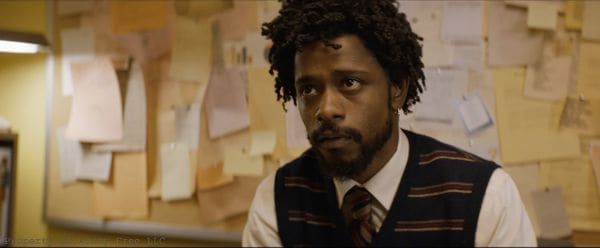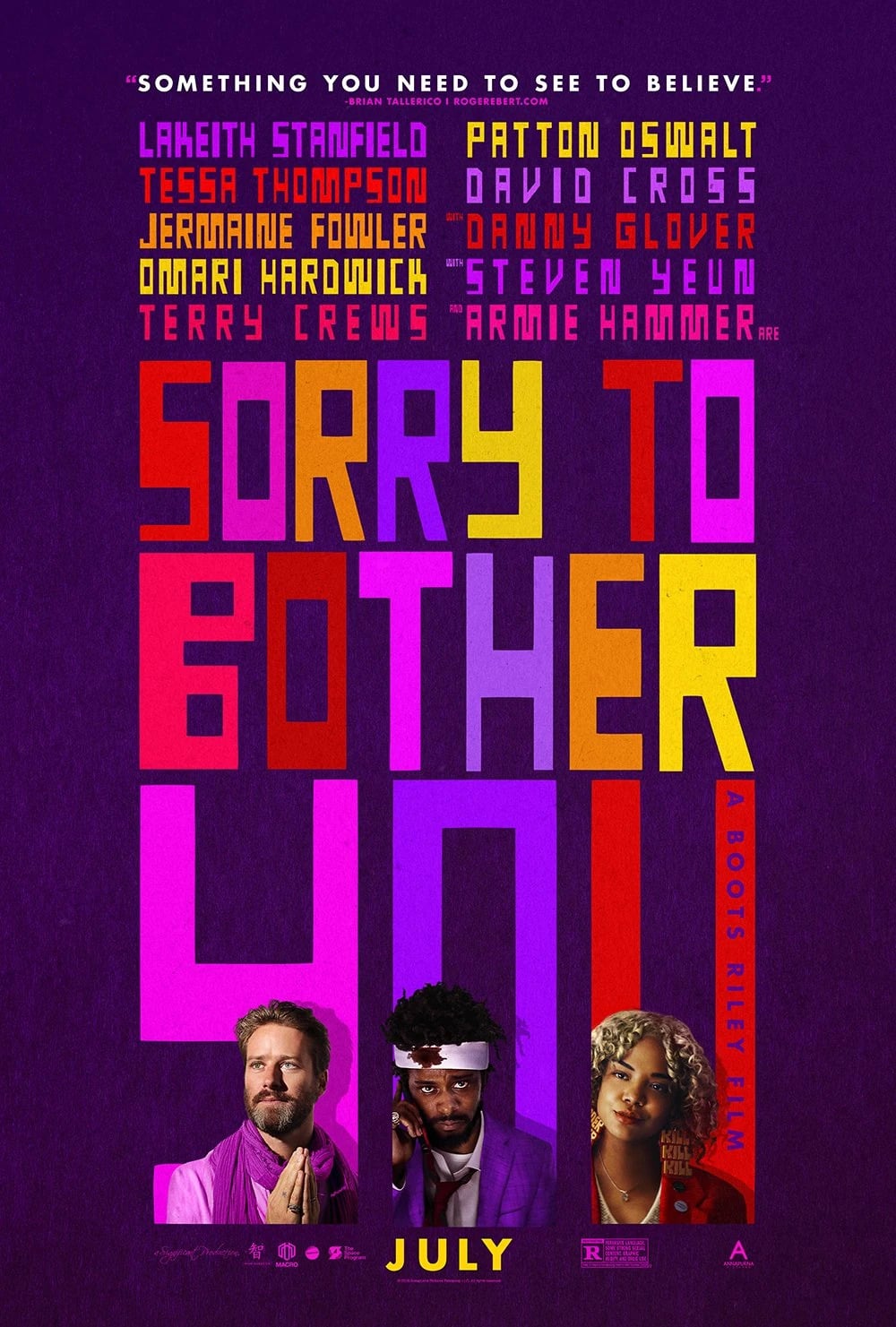Eye For Film >> Movies >> Sorry To Bother You (2018) Film Review

Sorry To Bother You is a film that I have been sleeping on. To borrow vernacular that, and inaccurately. I have not failed to recognise its quality, its invention and its power. What I have failed to do, repeatedly, is tell you about it here.
There's a quote attributed to William Gibson that suggests the future is here, just not yet evenly distributed. From 2023, the film appears not only prescient but, I would argue, timeless, in a way that marks it as a (cult) classic. As we get works based on the collapse of WeWork, as we see the consequences of labour organisation in corporate monoliths like Starbucks, as a symbol and symptom of Trump era collapse, of this, that, the next thing. There's a phrase 'morally emaciated' but Sorry To Bother You has a belly full, rage in its liver.

I've seen it described as a film with a twist but that suggests it's got just one. It's full of them, it's made of them, it reels and gyres and tumbles into something special. It's a movie that in several ways is built around theft but it's not a caper, it's a dance. When its big changes come it's like the bass kicking in, the beat dropping. The world isn't fixed. What genre is history?
Writer/director Boots Riley made this as a début feature. While he'd studied film at university, it was as a member of Hip Hop group The Coup that he found fame. He also worked with Tom Morello in Street Sweeper Social Club. A declared communist, a former telemarketer, an African American. The film is so layered with detail and deftness that it almost defies examination. It's not a musical, but it is musical. Full of repetition, reprise, it drips with introductions, with hooks.
It continually grabs. It is full of ideas, nods, creativity. Some can be read as transcriptions of social phenomena like code-switching. Time's given new weight to some of those, a discussion of someone being "Will Smith White" in a film is reframed in light of last year's Oscars. The business of white-voices is hidden beneath the film's use of radical recontextualisation for telephony, transporting its protagonist into the eyeline and earshot of his contacts. It's an adventure throughout. Because of my reading habits, it reminded me of the science fiction of the Seventies, works by people like John Brunner, Robert Sheckley, Ursula LeGuin, Samuel R Delany. That in part because it's almost an anthology, an evolving episodic progression from the basement up. There's influence from Verhoeven's Robocop and Starship Troopers, from The Running Man (and in particular its source works). There's nods and homages from all over, but it's in the style of. It takes its licks with light fingers.
LaKeith Stanfield is Cassius Green, David Cross his White Voice. Not the only such pairing, girlfriend Detroit (Tessa Thompson/Lily James), mentor Langston (Danny Glover/Ryan Coursey), and the staggering figure of Mr. _____ (Omari Hardwick/Patton Oswalt), the cyclopean sine qua non of the Power Callers. Detroit's got a great line in ear-rings, great T-shirts, any or all of which you might see on the ears of someone cooler than you in a club you're not young enough for. Langston describes himself as too old for something which is maybe the laziest line in the entire thing, but that weariness is endemic, emblematic. Mr. _____ has more than a few shades of Chesterton or Conrad, but the secrecy and queer trades here are multifaceted. Steven Yeun's union-man Squeeze, Armie Hammer's Steve Lift, Terry Crews' Sergio, all vital to a plot in the same way that songs make an album.
Art abounds, Detroit's work, gallery and jewelry. Costume There's music, by the Coup and more. There's no set that doesn't feel right, and some where the transitions between them are an absolute delight. A bedroom upgrade is executed with precision that makes the fact it's done almost entirely in camera one of the highlights of the film. That's in a picture full of them, abounding in detail. Photocopies of photographs, posture within pictures. Industrial spaces, commercial endeavours, cosy garages and austere apartments. Viral videos, Hallowe'en costumes, game shows. Performance art within a film, "a transformative experience." Coltan, Blackwater, "the new fuck you".
It's got a great cast, performances and moments that reward those rewatches. I can't recapture the headlong novelty of the first time I saw it, but I can get close. With Riley about to release an equally high concept television show (But I'm A Virgo) this is a great time to get on board. Riley gives good Twitter, and there are echoes of Dorsey and Musk in Hammer's maniacal lift. Stanfield may be better known from Get Out, Judas & The Black Messiah and Donald Glover's show Atlanta, but this is as much his film as Riley's. That despite an astonishing number of minor roles occupied by differently famous faces and voices. What recommendations can I give? This is a film that I watch again, for pleasure. It doesn't need me to sell it, but I'll try anyway. It will bother you, but you won't be sorry.
Reviewed on: 27 May 2023














